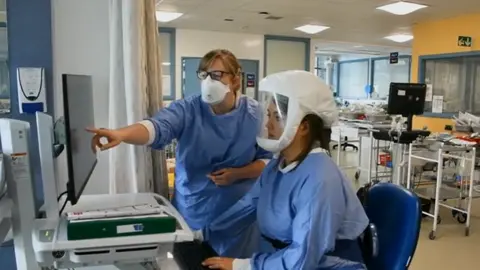 BBC
BBCMoves to cut NHS Wales deficits are not working, according to the auditor general.
That is despite a huge cash injection from the Welsh government, cuts by health boards and a reduction in agency spend.
Adrian Crompton said “fundamental challenges now need to be grasped around the shape and infrastructure of the NHS”.
The Welsh NHS Confederation, representing the sector in Wales, described it as a “wake-up call” for governments to be honest with the public “about the need for long-term service change and what this might look like”.
The Welsh government said four health boards had achieved their target deficits set by ministers against the background of a “very challenging financial climate”.
The audit of NHS bodies’ accounts shows the three-year overspend across the NHS increased from £248m in 2022-23 to £385m in 2023-24.
For 2023-24 alone, the deficit rose to £183m, from £150m the previous year.
But while spend on agency staff has grown overall since 2018, it fell in the last year by 19%.
The majority of this spend covers workforce vacancies, but includes staff sickness and efforts to reduce the backlog and significant patient demand.
The reduction has also been helped by there being no longer any workforce pressures due to Covid, which had added to cost pressures in previous years.
When we look at the detail, we can see how Hywel Dda health board – responsible for mid and west Wales hospitals – has by far the biggest cumulative deficit at nearly £150m.
This is followed by Aneurin Bevan health board (£86.3m) over the three-year period.
The NHS in Wales received £10.6bn of revenue funding in the most recent financial year and a cash uplift of £744 million.
While the uplift was more than five times more than the extra cash given the previous year, it represented a 1.2% real terms increase in funding, such is the impact of rising inflation.
The amount of savings being made by NHS bodies in Wales rose to £210 million and is now at its highest level for five years.
However, the auditor said that still relies heavily on one-off, non-recurrent savings.
The report concluded: “It is proving increasingly difficult for NHS bodies to produce financially balanced plans in the current climate of cost pressures and service demand.”
Mr Crompton added: “The growing cumulative deficit for the NHS in Wales demonstrates that despite record levels of investment and higher than ever levels of savings, the statutory framework put in place by the Welsh government to drive financial sustainability in the NHS is not working.
“Whilst there remains an urgent need for NHS bodies to continue to drive out cost inefficiencies in the way they work, this alone is unlikely to return the NHS to financial balance.”
He said more fundamental challenges now needed to be grasped “around the shape and infrastructure of the NHS”, the level of funding it needs, its workforce challenges and how the demand for its services can be better managed.
“These are issues that should exercise the minds of politicians, government officials and NHS bodies and their partners in equal measure.”
Darren Hughes, director of the Welsh NHS Confederation, said the report highlighted the “enormous financial challenges in the NHS, which is facing historic levels of pressure”.
“We need commitments from governments to longer term thinking, including focusing on prevention to reduce demand, shifting more care into the community, sufficiently investing in NHS estates and infrastructure to improve efficiency and ring-fenced investment so social care staff can have parity of pay.”
The Welsh government said alongside an additional £425m in funding during 2023-24, NHS Wales had delivered record levels of savings.
“Although all health boards breached their financial duty in 2023-24 – against the background of a very challenging financial climate – four achieved the target deficit set by Welsh government and both special health authorities and all NHS trusts met their financial duty to break-even,” said a spokesperson.
It said for 2024-25, the Welsh government has prioritised NHS funding with an increase of more than 4%, compared to less than 1% in England.
Welsh Conservatives blamed the “abysmal news” regarding the deficits on Labour “prioritising politicians and pet projects over the running of the Welsh NHS”.
Plaid Cymru called it a “damning indictment” of successive Labour health ministers failing to put the Welsh NHS on a sustainable footing.
